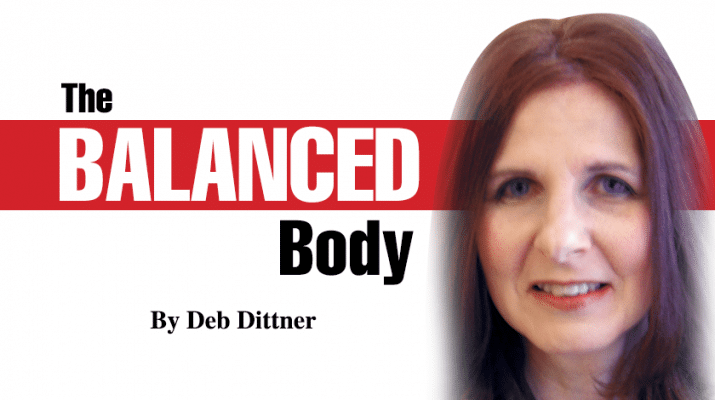Homeopathic approach results in controlling hypertension
By Deb Dittner
 High blood pressure, or hypertension, is known as the “silent killer” as it can slowly create damage without any symptoms.
High blood pressure, or hypertension, is known as the “silent killer” as it can slowly create damage without any symptoms.
Uncontrolled blood pressure can cause stroke, kidney problems, and heart failure, narrowing of the arteries, eye problems, dementia, and more. But what you eat — and you all know what a foodie I am — can help decrease blood pressure if it is already borderline or elevated.
One of my favorites is flax seed as this helps in reducing inflammation. Adding 2 tablespoons to ¼ cup of ground flax seeds daily has shown significant reduction in blood pressure.
Ground flax seed can be added to oatmeal, smoothies, muffins or pancakes. Other seeds such as chia or pumpkin seeds may also help to lower blood pressure as they are rich in magnesium.
Wild caught salmon, 5 ounces three times a week, is rich in omega-3 fatty acids. Fish oil capsules have a similar effect when it comes to blood pressure. Also rich in monounsaturated fats, omega-3 fatty acids, polyphenols and Omega-6 fatty acids is extra virgin olive oil. Drizzle over salads and vegetables at approximately 2 tablespoons daily to appreciate the benefits.
Dark green leafy vegetables such as spinach, arugula, beet greens, turnip greens, collard greens, Swiss chard and more contain potassium necessary in balancing electrolytes in the body and helping the kidneys get rid of excess sodium. These greens are also rich in magnesium that aids in dilating blood vessels.
Sweet potatoes, butternut squash and baked white potatoes are starchy vegetables and need to be limited to 1 cup daily, but contain plenty of potassium to aid in lowering blood pressure.
Berries such as strawberries, blueberries, and raspberries are rich in polyphenols and Vitamin C which help to decrease inflammation in the arteries. Berries can be added to smoothies, oatmeal, salads, and made into ice pops as a refreshing dessert. Berries also benefit brain and bowel health.
Lentils and beans — white, kidney, black, and lima — are rich in potassium and magnesium and indeed are a heart-healthy choice.
Beetroot is rich in potassium, polyphenols, and nitrates that help to relax blood vessels. Beetroot can be added to smoothies, roasted, or drank in the form of beet juice.
Nuts, specifically pistachio, have been shown to reduce blood pressure by eating 1 serving daily. Other nuts did help in lowering blood pressure but are not as effective.
Garlic is just an overall super food. Allicin is the active ingredient in garlic with fresh garlic containing more than cooked. Add minced garlic (1-to-4 cloves daily) to salad, salad dressings or dips such as hummus and tahini.
Now who doesn’t enjoy dark chocolate?
Dark chocolate that is greater than 70% cacao is rich in polyphenols and magnesium, aiding not only in blood pressure but also sleep. Consider one square added to your diet to also support cardiovascular health.
Now that you are eating foods to help lower blood pressure, let’s look at other lifestyle changes that create benefit as well.
— Movement comes in many forms but one that aids in blood pressure, flexibility and strength, and mental health is yoga. Just 15 minutes of yoga five times weekly may be as effective as commonly prescribed medications to lower blood pressure. Regular exercise keeps the body’s organs pumped with oxygen and nutrients.
— Meditation and deep breathing techniques aid in reducing blood pressure, anxiety and stress.
— Sleep consisting of seven to nine hours nightly also aids in blood pressure management. If you have sleep apnea, discuss this with your primary provider.
Sleep apnea can be a negative side effect of being overweight. Manage your weight to decrease your risk of metabolic syndrome, vascular disease, coronary artery disease, and hypertension.
And remember — have fun! Go out and find happiness as this too helps in reducing blood pressure.
Looking for happiness? Here are some suggestions:
• Treat others the way you want to be treated
• Say hello, and smile at a stranger.
• Be kind and polite, and respect your elders.
• Be patient with yourself and others, listen, and be kind to animals.
Enjoy life!
This information is for educational purposes. Please consult with your primary care provider before beginning a new approach.
• Deborah Dittner is a family nurse practitioner and health consultant. Her mission is to transform as many individuals as possible through nutrition and lifestyle changes. For more information, check out her website at www.debdittner.com or contact her at 518-596-8565.

